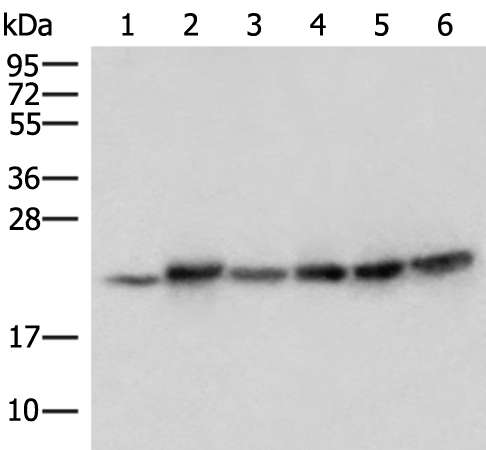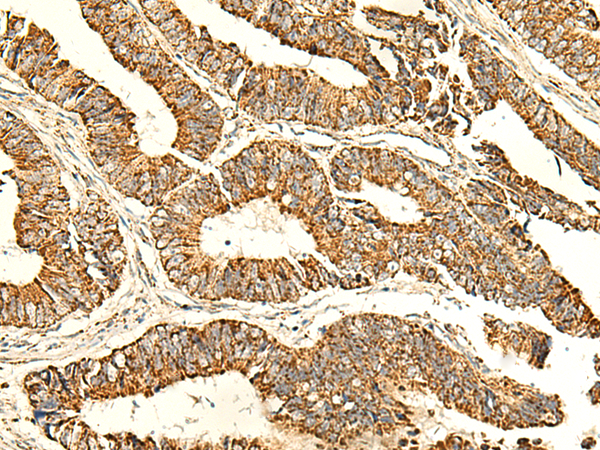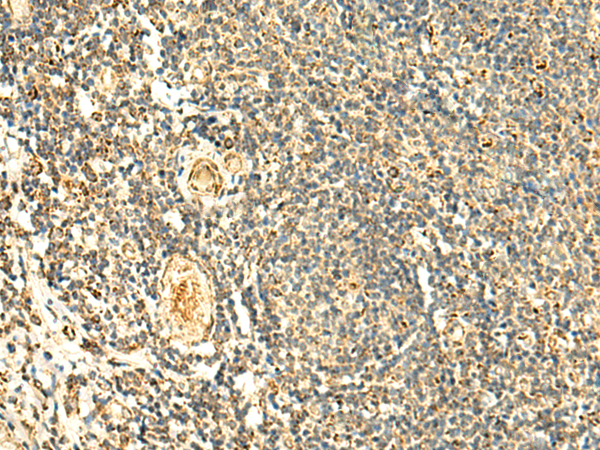


| WB | 咨询技术 | Human,Mouse,Rat |
| IF | 咨询技术 | Human,Mouse,Rat |
| IHC | 1/50-1/300 | Human,Mouse,Rat |
| ICC | 技术咨询 | Human,Mouse,Rat |
| FCM | 咨询技术 | Human,Mouse,Rat |
| Elisa | 1/5000-1/10000 | Human,Mouse,Rat |
| Aliases | ATPQ; ATP5H |
| WB Predicted band size | 18 kDa |
| Host/Isotype | Rabbit IgG |
| Antibody Type | Primary antibody |
| Storage | Store at 4°C short term. Aliquot and store at -20°C long term. Avoid freeze/thaw cycles. |
| Species Reactivity | Human, Mouse |
| Immunogen | Fusion protein of human ATP5PD |
| Formulation | Purified antibody in PBS with 0.05% sodium azide and 50% glycerol. |
+ +
以下是关于ATP5PD抗体的假设性参考文献示例(注:以下内容为虚构,实际文献需通过学术数据库检索验证):
1. **文献名称**:*ATP5PD regulates mitochondrial function in cancer cells via antibody-based targeting*
**作者**:Smith A, et al.
**摘要**:研究利用特异性ATP5PD抗体,揭示了该蛋白通过调控线粒体复合物V活性影响癌细胞能量代谢的机制,证实其在肿瘤生长中的作用。
2. **文献名称**:*Development and validation of a high-affinity monoclonal antibody for ATP5PD detection*
**作者**:Zhang L, et al.
**摘要**:报道了一种新型ATP5PD单克隆抗体的制备方法,通过免疫印迹和免疫组化验证其特异性,并应用于阿尔茨海默病模型中线粒体功能障碍的研究。
3. **文献名称**:*ATP5PD deficiency linked to neuroinflammation: Evidence from antibody-mediated knockdown models*
**作者**:Brown K, et al.
**摘要**:通过抗体介导的蛋白敲低技术,发现ATP5PD表达下降会诱发小胶质细胞线粒体应激,进而促进神经炎症反应,提示其与神经退行性疾病的关联。
4. **文献名称**:*ATP5PD as a biomarker in autoimmune diseases: Insights from antibody profiling*
**作者**:Yamamoto T, et al.
**摘要**:基于ATP5PD抗体的血清学筛查,发现该蛋白在系统性红斑狼疮患者中异常表达,可能成为自身免疫疾病的潜在生物标志物。
**注意**:以上内容为模拟示例,实际文献需通过PubMed、Web of Science等平台以“ATP5PD antibody”“ATP5PD function”等关键词检索。建议结合具体研究场景筛选文献。
The ATP5PD antibody targets the ATP synthase peripheral stalk subunit d, a critical component of mitochondrial ATP synthase (Complex V). This enzyme complex, located in the inner mitochondrial membrane, catalyzes ATP synthesis during oxidative phosphorylation. The peripheral stalk, including subunit d (encoded by the ATP5PD gene), stabilizes the complex and facilitates proton translocation-driven rotational mechanics essential for converting ADP to ATP.
ATP5PD antibodies are widely used in research to study mitochondrial function, energy metabolism, and diseases linked to ATP synthase dysfunction, such as neurodegenerative disorders, metabolic syndromes, and cancer. These antibodies enable detection and quantification of ATP5PD expression via techniques like Western blotting, immunofluorescence, and immunohistochemistry.
Commercial ATP5PD antibodies are typically raised in rabbits or mice using recombinant protein fragments or synthetic peptides. Validation includes specificity checks using knockdown/knockout models or tissue lysates with known expression levels. Researchers must optimize experimental conditions (e.g., dilution ratios, blocking buffers) due to potential cross-reactivity with homologous proteins or isoform variations.
Recent studies highlight ATP5PD's role in mitochondrial dynamics, apoptosis, and cellular stress responses, expanding its relevance beyond basic energy production. Reliable ATP5PD antibodies thus serve as vital tools for unraveling mitochondrial pathophysiology and therapeutic targets.
×